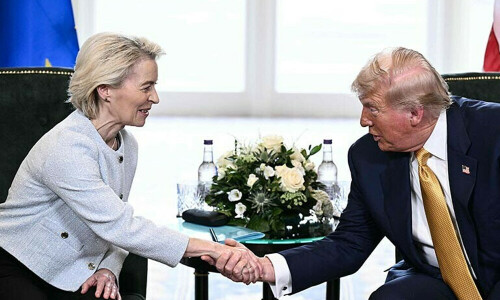US and EU Reach Agreement to End Tariff Dispute
TURNBERRY: Over the weekend, US President Donald Trump and EU Commission President Ursula von der Leyen jointly declared they had come to terms on a resolution to the transatlantic tariff disagreement, successfully preventing a significant trade conflict.
The understanding was achieved just before the August 1 deadline, which would have required the European Union to finalize an agreement with Washington or be subjected to a widespread 30 percent tax by the US.
“We’ve come to an arrangement. It’s beneficial for everyone involved,” Trump communicated to journalists following a crucial discussion with von der Leyen at his golf resort in Turnberry, Scotland.
Key Aspects of the Agreement
Trump informed reporters that the arrangement encompasses a foundational tariff of 15 percent on EU exports to the United States. This matches the rate secured by Japan. The tariff applies to vital sectors like the auto industry, which is presently taxed at 25 percent.
“We are in consensus that the tariff will be consistent at 15 percent for automobiles and all other items,” Trump stated.
He further added that the EU has committed to procuring “$750 billion in energy resources” from the United States, along with an additional $600 billion in further investments within the nation.
Representing the EU’s 27 member countries, the European Commission, helmed by von der Leyen, had been aggressively striving to preserve a trading partnership valued at $1.9 trillion annually in goods and services.
“This is a positive agreement,” the EU chief conveyed to the press, alongside Trump, after their hour-long conversation.
“It’s going to ensure steadiness and predictability, which is crucial for businesses on both sides of the Atlantic,” she emphasized.
Implications and Previous Tariffs
Since Trump assumed office, the EU has encountered numerous tariff implementations. It currently faces a 25 percent tax on vehicles, a 50 percent tax on steel and aluminum, and an overarching 10 percent tariff, which Washington threatened to escalate to 30 percent if no deal was reached.
Brussels had concentrated on securing an agreement to avert extensive tariffs that would further impair its struggling economy, with retaliation being reserved as a final option.
Nonetheless, the agreement, as outlined by Trump, seemed to underperform the EU’s anticipations.
The EU had been advocating for tariff exemptions for essential sectors ranging from aircraft to spirits. Its automotive sector, vital for France and Germany, is already suffering from the levies imposed thus far.
Any agreement will necessitate approval from EU member states, whose ambassadors, who were visiting Greenland, received an update from the commission earlier Sunday. They planned to reconvene after the agreement was finalized in Scotland.
Trump clarified that pharmaceuticals, a significant export for Ireland, which the EU has sought to safeguard, “will not be encompassed” in any agreement.
“We need to have them manufactured and produced in the United States,” the president commented. Earlier this month, Trump proposed the possibility of a 200 percent tariff on medications imported into the United States, which would severely impact the European sector.
The EU also sought a compromise on steel that would permit a specific quota to enter the United States before tariffs would be imposed. However, Trump dismissed this, affirming that steel regulations were “remaining unchanged”.
While a 15 percent tariff would be substantially higher than the pre-existing US tariffs on European goods, which average around 4.8 percent, it would reflect the present situation, with companies currently confronting an additional flat rate of 10 percent.
If the negotiations had failed, EU states had sanctioned counter tariffs on $109 billion worth of US goods, including aircraft and cars, scheduled to take effect in phases starting August 7. Brussels was also compiling a list of US services that could potentially be targeted.
Furthermore, countries like France contend that Brussels should not hesitate to utilize a so-called trade “bazooka,” which is EU legislation crafted to counter coercion that can entail restricting access to its market and public contracts.
Trump has initiated a campaign to reshape US trade relations globally and has pledged to impose punitive tariffs on numerous countries if they do not reach an accord with Washington by August 1.
US Commerce Secretary Howard Lutnick affirmed on Sunday that the August 1 deadline was definite, stating that there would be “no extensions, no further grace periods”.



Comments (0)
No comments yet. Be the first to comment!
Leave a Comment